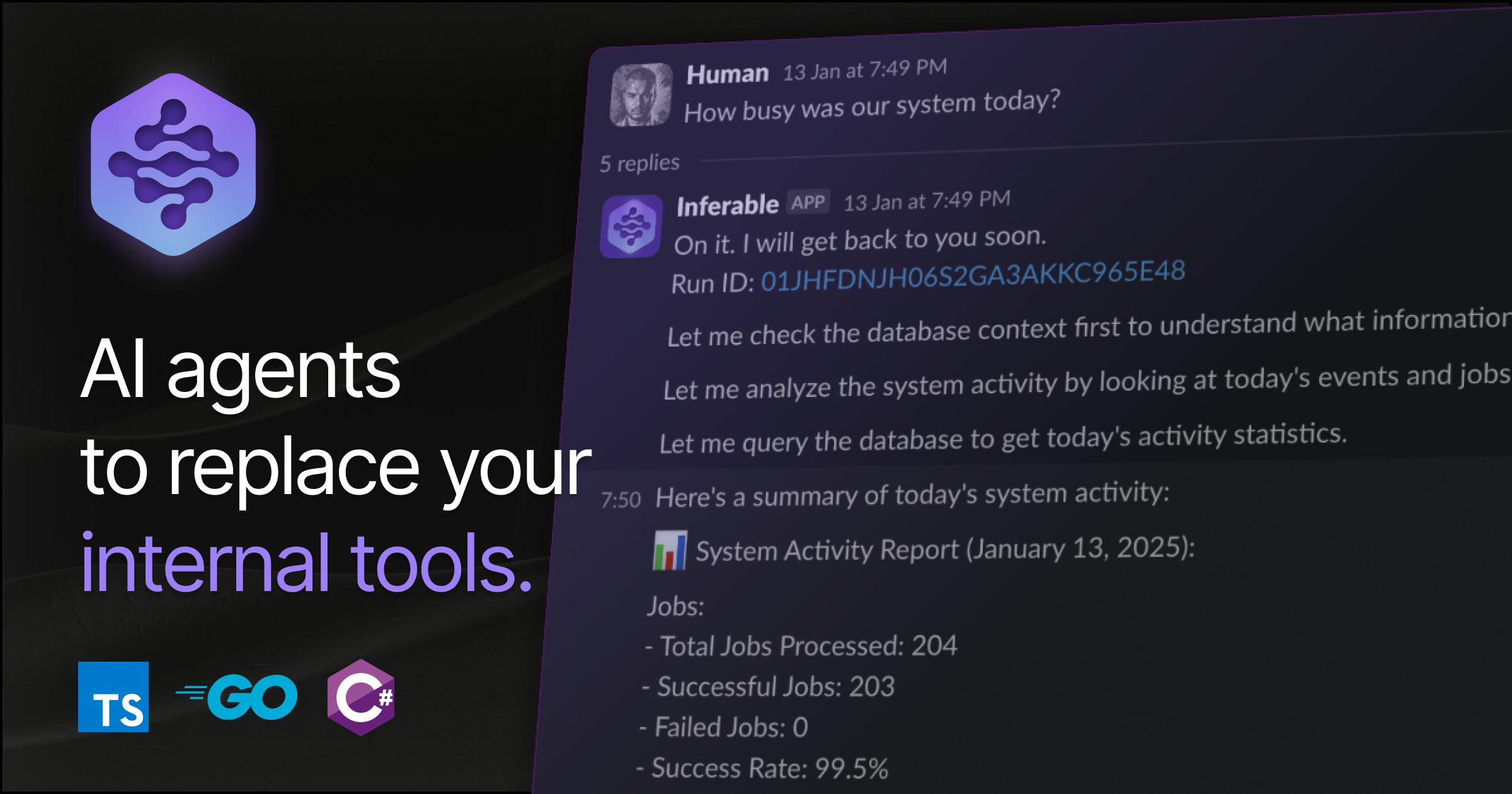Table of Contents
Overview
Tired of juggling multiple tools and interfaces just to get simple tasks done? Imagine a world where you can interact with your internal systems and APIs using natural language, directly from your favorite communication platforms. Inferable.ai promises to bring that vision to life. This open-source platform empowers developers to build conversational AI agents that seamlessly connect with internal tools, APIs, and databases. Let’s dive into what makes Inferable.ai a compelling option for streamlining your workflows.
Key Features
Inferable.ai boasts a range of features designed to simplify the creation and deployment of conversational AI agents:
- Conversational interface for APIs/functions: Transform your existing APIs and functions into natural language-accessible interfaces, allowing users to interact with them through conversational commands.
- Slack and email integration: Connect your agents to Slack and email, enabling users to interact with them directly from their preferred communication channels.
- Programmatic access via APIs: Access and control your agents programmatically via APIs, allowing for seamless integration with other systems and workflows.
- Open-source codebase on GitHub: Benefit from the transparency and collaborative development of an open-source codebase, fostering community contributions and customization.
- Minimal setup for deployment: Get your agents up and running quickly with a streamlined setup process that requires minimal configuration.
- Customizable agent behavior: Tailor the behavior of your agents to meet specific needs and requirements, ensuring they align perfectly with your workflows.
How It Works
The core concept behind Inferable.ai is to bridge the gap between natural language and programmatic actions. Developers start by defining functions or API endpoints that they want to expose through a conversational interface. These functions are then registered with the Inferable platform. Inferable then wraps these functions into natural language-accessible agents. Users can then interact with these agents through connected channels like Slack or email, using natural language commands. The platform supports customizable logic, allowing developers to define how agents respond to different inputs and handle complex scenarios. Finally, the agents return structured results, making it easy to consume the output of the executed functions.
Use Cases
Inferable.ai opens up a wide range of possibilities for automating tasks and streamlining workflows:
- Internal tool automation via chat: Automate common tasks within your internal tools by allowing users to interact with them through a conversational interface.
- Support bots for developer teams: Create support bots that can answer common questions, troubleshoot issues, and provide guidance to developer teams.
- Automated report generation: Automate the generation of reports by allowing users to request them through a conversational interface.
- Querying business data from chat: Enable users to query business data directly from chat, eliminating the need to switch between different applications.
- Integrating dev functions with comms platforms: Seamlessly integrate development functions with communication platforms like Slack and email, improving collaboration and efficiency.
Pros & Cons
Like any tool, Inferable.ai has its strengths and weaknesses. Let’s break them down:
Advantages
- Quick setup with few lines of code: Get your agents up and running quickly with a minimal amount of coding effort.
- Versatile integration options: Integrate with a wide range of platforms and services through Slack, email, and APIs.
- Strong developer community via open source: Benefit from the support and contributions of a vibrant open-source community.
Disadvantages
- Requires programming knowledge: Some programming knowledge is required to define functions and configure agents.
- Limited to platforms with APIs: The platform is primarily designed for integrating with platforms that have APIs.
- May lack enterprise support features: The open-source nature of the platform may mean it lacks some of the enterprise-level support features found in commercial solutions.
How Does It Compare?
When considering conversational AI platforms, it’s important to understand how Inferable.ai stacks up against the competition. LangChain, for example, is another popular option, but it is more focused on multi-tool orchestration. Autogen Studio offers a broader AI agent framework but lacks the tight Slack integration that Inferable.ai provides. Inferable.ai distinguishes itself with its focus on simplicity, ease of use, and direct integration with internal tools and APIs.
Final Thoughts
Inferable.ai offers a compelling solution for developers looking to build conversational AI agents that seamlessly connect with internal tools and APIs. Its open-source nature, combined with its ease of use and versatile integration options, makes it a strong contender for automating tasks and streamlining workflows. While it may require some programming knowledge, the benefits of increased efficiency and improved collaboration make it a worthwhile investment for many teams.
